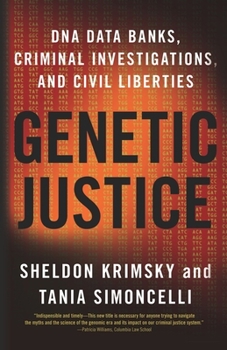Genetic Justice: DNA Data Banks, Criminal Investigations, and Civil Liberties
Select Format
Select Condition 
Book Overview
National DNA databanks were initially established to catalogue the identities of violent criminals and sex offenders. However, since the mid-1990s, forensic DNA databanks have in some cases expanded to include people merely arrested, regardless of whether they've been charged or convicted of a crime. The public is largely unaware of these changes and the advances that biotechnology and forensic DNA science have made possible. Yet many citizens...
Format:Paperback
Language:English
ISBN:0231145217
ISBN13:9780231145213
Release Date:April 2012
Publisher:Columbia University Press
Length:448 Pages
Weight:1.25 lbs.
Dimensions:0.9" x 6.0" x 8.9"
Grade Range:Postsecondary and higher
Related Subjects
Biological Sciences Biology Biology & Life Sciences Chemistry Civil Rights Civil Rights & Liberties Criminal Law Criminal Procedure Criminology Evolution Forensic Science General & Reference Genetics Law Political Science Politics & Government Public Policy Science Science & Math Science & Scientists Science & Technology Social Science Social Sciences Specific TopicsCustomer Reviews
0 rating





